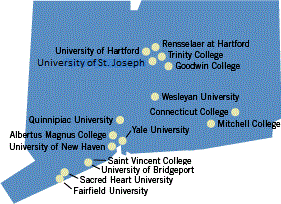Reductions in Financial Aid Would Harm CT Students in Independent Colleges
/Leaders of the state’s independent colleges and universities are expressing concern about the impact on their students of proposed plans that would merge the state’s three financial aid programs into one and substantially reduce funding over the next four years. The proposal would restrict both the amount of funds that financial aid directors may award needy Connecticut students and to whom they may award the funds, points out Judith Greiman, president of Connecticut Conference of Independent Colleges. Because the revamped system would no longer considering the cost of attendance, students at private colleges would be disproportionately impacted.
The plan is part of Gov. Malloy’s budget proposal is now being considered by the legislature. It consolidates the longstanding financial aid programs into a single Governor’s Scholarship Program. University of Hartford President Walter Harrison said the plan “will begin, brick by brick, to dismantle the strong array of independent colleges and universities” in Connecticut.
“While we understand the difficult budget issues that continue to impact state services, we must point out that the three primary state-funded financial aid programs, CICS, CAPCS and Capitol Scholars, have been substantially cut in the past two budgets and in the FY 13 rescission,” Greiman told the legislature. “This comes at a time of historically high student need. Cutting need-based grant aid any further will only hurt Connecticut’s students and families.”
 The proposal also shifts funding from the two need-based aid programs to a program that determines financial aid based on need and merit. In addition, for the first time it would reduce the amount of grant funds available to students by using some of the money to pay for state agency administrative costs.
The proposal also shifts funding from the two need-based aid programs to a program that determines financial aid based on need and merit. In addition, for the first time it would reduce the amount of grant funds available to students by using some of the money to pay for state agency administrative costs.
Discussing the students helped by the state grants, Martha Shouldis, President of St. Vincent’s College in Bridgeport, told the legislature’s Higher Education committee that almost one-half of nursing graduates in the state, for example, are educated at private colleges. She pointed out that students are “not only educated here but have a record of gaining employment here in Connecticut – they are an important part of the state health care labor pool now and in the future.”
CCIC has highlighted the role of the 16 independent institutions on Connecticut. The schools:
- Enroll 31% of all college students statewide including 45% of four-year minority students.
- Award 44% of all degrees granted in Connecticut in 2010-11, including 44% of all Bachelor’s, 64% of all Master’s and 58.5% of all Doctoral and 57% of all Professional degrees.
- Award 57% of all degrees received by minority students (four-year and above).
- Award 53-72% of four-year and above degrees given in key economic development cluster areas.
- Provided almost $65 million annually in need-based institutional financial aid to Connecticut undergraduates in 2010-11.

The CCIC institutions include Albertus Magnus College, Connecticut College, Fairfield University, Goodwin College, Mitchell College, Quinnipiac University, Rensselaer at Hartford, Sacred Heart University, St. Vincent’s College, Trinity College, University of Bridgeport, University of New Haven, University of Hartford, University of Saint Joseph, Wesleyan University and Yale University.






























